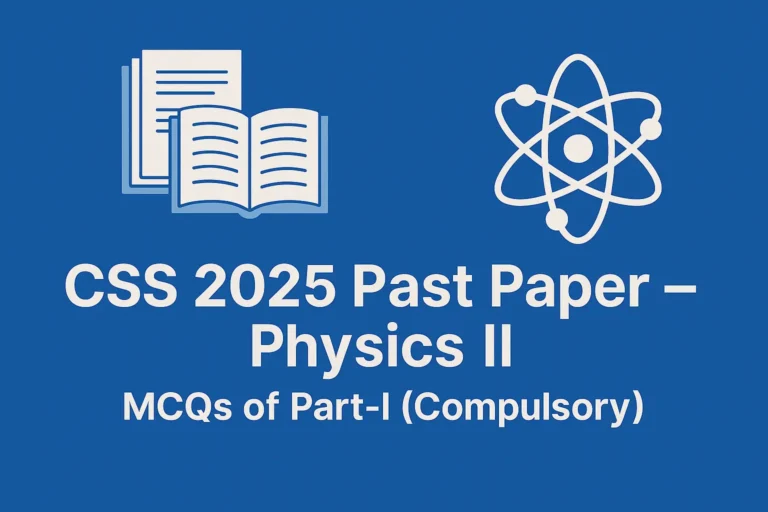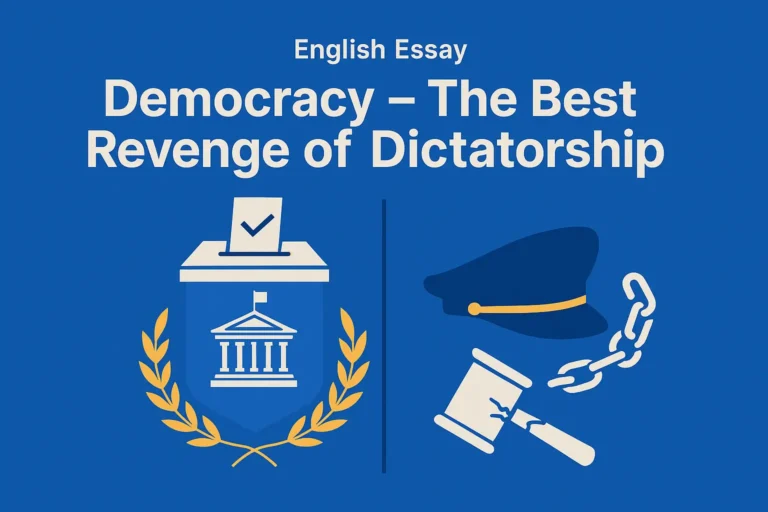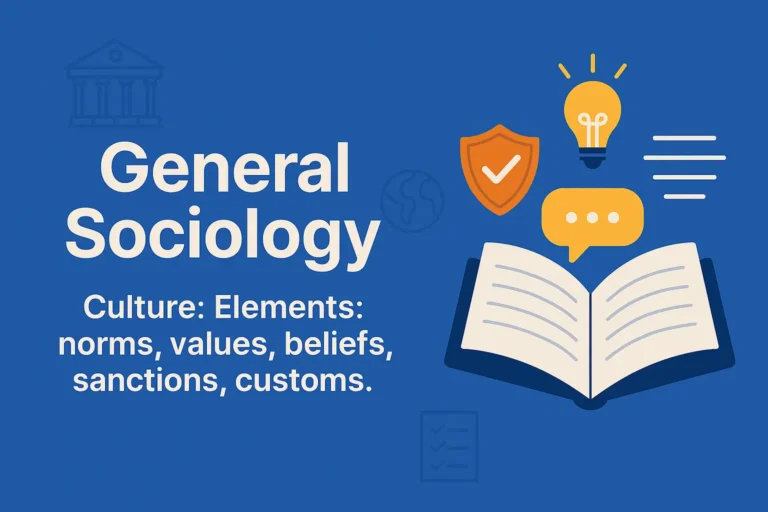Declining Education Standards
(English Essay – CSS & PMS)
Outline
- Introduction
- Complexity of the Phenomenon
- Lack of Independent Thinking
- Teacher Competency Issues
- Lack of Reading Habit
- English Language as a Challenge
- Medium of Instruction and National Integration
- Syllabus Revision and Examination Reforms
- Booty Mafia and Unfair Means
- Multi-Front Strategy for Improvement
- Government Role and Policy Implementation
- Conclusion
Introduction
There are different types of crises gripping the nation at present. One of the severest crises is that of education, as reflected in lamentably low standards. The results announced in the public examinations at different levels reveal a low pass percentage, indicating a high level of inefficiency in the utilisation of various educational inputs at different tiers of education. Apart from the wastage of resources, the low standard of education is worrisome. There are causes contributing to this phenomenon, which need a brief analysis here.
Complexity of the Phenomenon
The decline in education standards is a complex issue shaped by a variety of factors, both academic and non-academic. It cannot be pinned down to just a handful of reasons, as it stems from a combination of influences over time. To understand it better, it is important to first examine the academic aspects.
Lack of Independent Thinking
Our education system fails to encourage independent thinking in students, as little attention is given to exploring the “how,” “why,” “when,” and “where” of knowledge. As a result, core concepts remain unclear, which hinders students’ initiative and stifles their ability to think critically.
The Western education system encourages exploring the “whys” and “hows”. It greatly helps in nurturing a rational and analytical mindset among students. The private schools like Beacon House System, English Grammar and City Schools impart education on the pattern of the western education resting on the above-referred values: Students are thus armed with logic to argue for and against things. That stimulates mental growth of students.
The public-managed schools pay a little attention to this aspect and students remain mired in cramming, which is thought to be anti-intelligence in character. Hence if the objective is to raise and upgrade the level of education in Pakistan, particular attention will have to be paid to this aspect. Needless to say that teacher’s own concepts invariably lack in clarity at the secondary/college levels and are characterised by an element of vagueness.
Teacher Competency Issues
When teacher’s own concepts are not clear, they will not be able to remove fog around the concepts at the time of teaching and students would suffer in developing proper understanding of concepts. These are teachers who are clear headed, imparting clear headedness to their pupils, do a great service to students. I don’t deny the existence of teachers who wish to promote clarity of thought among their pupils based on their fresh knowledge.
Lack of Reading Habit
Another major obstacle to mental growth is the lack of a reading habit among students. Only a small number make use of their free time to visit libraries, read newspapers, or borrow books for personal study. Those who cultivate a regular reading habit often excel in life, particularly in competitive examinations.
Unfortunately, most students avoid reading novels, short stories, or poetry in their original form. Instead, they rely on guides and help-notes merely to pass exams. This approach leaves their knowledge shallow, as they miss out on the depth and richness of original sources.
If the goal is to improve the quality of education, the habit of reading must be actively encouraged and developed at the college and university levels. Teachers themselves should act as role models in this behalf and inspire students to read extensively to enrich their mind critically.
Old teachers had a rich personal library of their own, who added new stock of books to the existing ones. Though they were subject to economic constraints but they had the passion to go in for new arrivals. They bought books to satisfy their intellectual curiosity. They were zealous readers who preferred acquisition of knowledge to money.
It’s rather unfortunate that this trend has changed as the present-day ordinary teacher runs after worldly things instead of knowledge. The old politicians like late Mushtaq Ahmed Gurmani, Mumtaz Daultana and their ilk had a profound love for books. Nehru was a scholar who wrote, Discovery of India, which I believe still embellishes the old libraries in Pakistan. The politicians of the type got books booked for their libraries, which came under their personal study to add to their mental outlook and perception. Those good trends seem to have become extinct in the present-day material set up of life.
English Language as a Challenge
English are the Achilles’ heels of students in Pakistan, since it is not their mother tongue. English is a foreign language which has to be learnt by the students as all modern literature, especially in the field of physical sciences like Physics, Chemistry, Mathematics, Botany, Zoology, is in English.
All modern researches are done in English, which are to be picked up by Pakistani students to carry on their studies and researches. English in a way has become imperative for us to read and learn.
Other independent nations like France, China, Japan impart instruction even at higher level in their own languages. The modern literature reflecting new researches in English is proliferated into these countries, which is translated immediately into the national languages. There are satisfactory arrangements to render foreign literature to the national languages. The latter get enriched and the process of research continues in the medium of national languages.
Medium of Instruction and National Integration
Conditions in Pakistan are totally different. No serious effort has been made to develop Urdu language, which could answer all our problems. English is regarded as a status symbol by the elite classes, comprising the bureaucracy in the higher echelon, landed element and the industrialist.
There are two streams of education, one for the privileged and the other for the underprivileged. The former imparts education in the medium of English, while in the latter Urdu is the medium of instruction. This very fact militates against the concept of national integration.
English has to be learnt as a matter of compulsion. Secondary school teachers have to assume the responsibility of teaching the basics of the English Grammar including tenses, active/passive voice, direct, indirect narration etc. The college teachers must check the composition of students both at the Inter/degree levels to help raise the standard of education. Composition writing should engage the attention of secondary/college teachers.
Syllabus Revision and Examination Reforms
Syllabi in all subjects should undergo regular updates to keep pace with global academic standards. Ideally, they should be reviewed and revised every five years to ensure they remain relevant, up to date, and aligned with international benchmarks. The introduction of MCQs is a good device to test the learning of students. It encourages comprehensiveness and discourages fragmentary learning.
Booty Mafia and Unfair Means
The menace of the so-called “booty mafia” must be eradicated without compromise. It should be confronted with firm and decisive action to safeguard the sanctity of degrees and certificates awarded to students. Provincial governments must show strong political will and implement practical measures through effective planning in Boards and Universities to eliminate the use of unfair means in intermediate, degree, and postgraduate examinations.
Authorities responsible for conducting examinations must be held accountable and strictly monitored to stamp out malpractice. Furthermore, the government should avoid extending the tenure of secretaries or controllers of examinations in provincial boards beyond the prescribed limit. Bringing in fresh leadership is essential to prevent stagnation, break entrenched vested interests, and restore integrity to the examination system.
Multi-Front Strategy for Improvement
As stated earlier, the problem is to be attacked on multi-fronts. Teachers need to be exposed to new training techniques to impart knowledge in a better progressive manner. Monitoring needs to be strengthened. Implementation needs improvement most effectively.
Let us abandon the habit of making paper tigers if we wish to survive in the 21st Century, demanding action and not mere rhetoricism. The standard of education must be raised at all levels of education. Our salvation lies in that if we are to survive the severest competition of the 21st Century.
Government Role and Policy Implementation
Our government should show the will to spare the budgetary resources for the development of education at different tiers. The National Education Policy, 2009, shows its resolve to earmark 7% of GDP to the national education.
It’s a good resolve, but keeping in view of the past performance, one becomes doubtful if the objective could be realised. The need of the time is to allocate the highest percentage of GDP to education to facilitate the process of human capital formation and to raise the level of research and development to benefit from the modern technology.
Upgradation of the level of education holds a key to the national success. There is a pressing need to enhance the quality of education, particularly in government-run schools and colleges across the country. It calls for the training of teachers at the aforesaid levels.
If the objectives were achieved, it would discourage the encouragement of the institutions like Beacon House School, City School, Grammar School and their ilk. The students coming of poor, average middle class families would be attracted to public schools. The establishment of ‘Danish Schools’ in the Punjab appears to be a right steps in the right direction.
Conclusion
The crisis of declining education standards in Pakistan is multi-faceted, rooted in both academic and non-academic causes. From unclear teacher concepts, lack of reading habits, and over-reliance on cramming, to issues of language medium, outdated syllabi, and examination malpractices — the challenges are deep and interconnected. Sustainable improvement demands a comprehensive approach: investing in teacher training, fostering independent thinking, promoting reading culture, ensuring fair examinations, revising curricula to international standards, and allocating adequate resources for education. Only by raising the quality at all levels can Pakistan prepare its students to meet the intellectual and competitive demands of the 21st century.
Click here to find more articles on English Essay.






